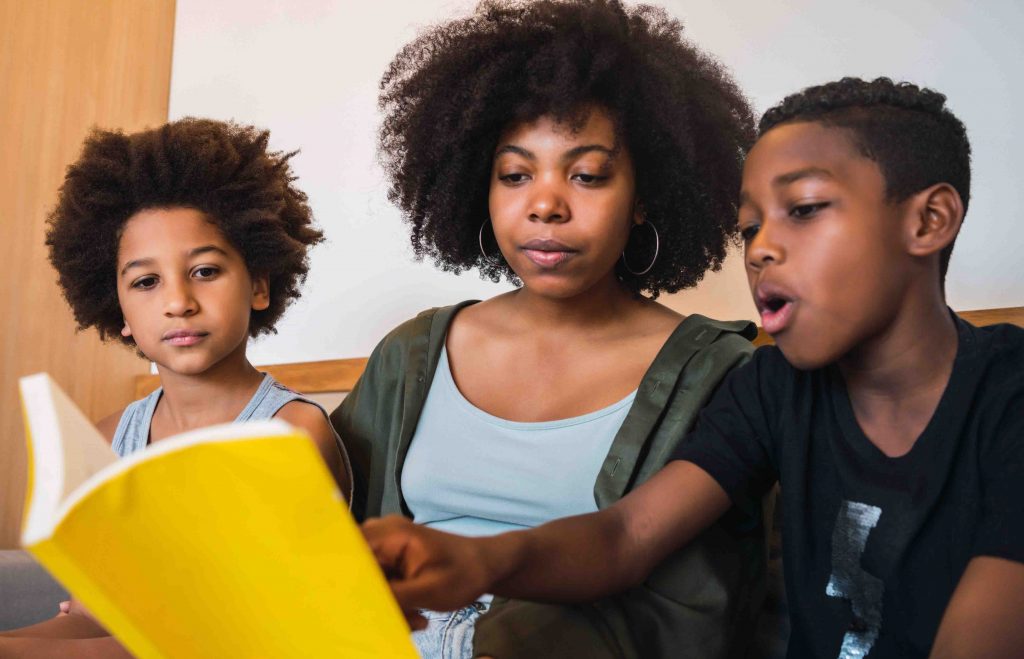
For those of us parenting through these uncertain times, one thing has felt absolutely certain: our children have not been getting all the education they have needed or would normally receive. And now summer is here.
Our children need to be outdoors running, swimming, reestablishing connections to others and to the world that once was. But that learning loss? How can we overcome that? What can we do in these precious weeks before school begins in the fall and life no doubt gets a little uncertain again?
The answers can’t always be found in electronic devices. The last things many kids need is more tablet time. Fortunately, a new answer doesn’t need to be found. It’s been here all along.
Novels are still a thing. Even with all the shining, flashing, beeping competition for their attention, many children still read and love books. Teachers, librarians, and parents all deserve credit for this. And so do authors. The first two decades of this young century have seen an explosion of children’s and young-adult (YA) literature worthy of your young readers’ attention.
These contemporary novels feature relatable characters, appealing genres, and engaging storylines. Many are as well written as the 20th century classics kids encounter in school, but these newer novels are of higher interest to today’s young readers.
Two examples of 21st century novels your child will likely love are Out of My Mind and The City of Ember. Both are highly rated and recommended by teachers and parents. Each overwhelmingly receives 5-star customer reviews on book-selling websites.
Out of My Mind by Sharon M. Draper
Empathy is the ability to understand others’ emotions, and it is a skill that is gaining focus in our children’s education. And like many skills, the past year has not given our children enough of a chance to interact and develop in this area. Out of My Mind is a bigtime empathy builder.
The novel’s narrator and main character is Melody, an extraordinarily bright and perceptive 11-year-old who also happens to have cerebral palsy. Her condition keeps her from walking, talking, and controlling her movements. She has a photographic memory and so many ideas to share, but she cannot easily communicate. She cannot get her thoughts out of her mind. Others can’t understand her, and they make assumptions about who she is. To hear her tell it, this really drives her out of her mind.
But then two things happen: Melody’s school begins integrating special-needs students such as herself with the able-bodied students, and Melody gets a special computer that gives her a voice. The novel offers her perspective on how others treat her and how they struggle to transition from who they thought she was to who she really is.
Three Reasons Why Your Young Reader Might Love This Book
- The main character is someone worth rooting for. Readers get to know her, they get to understand her challenges, and they want her to succeed.
- Young readers may respond to the concept of having ideas that they can’t yet express and abilities that they aren’t yet able to show.
- The school-age children are very authentic. They talk and act like actual fifth graders.
One Big Reason Why You Might Love that Your Young Reader Is Reading this Book
- This book is full of social-emotional lessons. It can inspire great conversations about what we can learn about ourselves, how others may see us differently than we see ourselves, and how we can approach life’s challenges and learn from life’s setbacks.
The City of Ember by Jeanne DuPrau
Proactivity is the ability to diagnose an issue and solve it before it becomes a problem. It’s self-initiated. No one tells you that something needs to be done: you figure it out yourself and you take the necessary steps. This is what the child characters in The City of Ember do.
The city of Ember was built long ago by the Builders. It is a city lit entirely by electricity; and its storerooms are stocked with all the vitamins, food, and supplies that its citizens need to survive. But lately, the ancient generator has been failing and supplies are running low. Everyone is terrified when the lights go out and the city is plunged into darkness, but they’ve never known a different life. What could even be done?
Lina and Doon know in their hearts that something is not right and that some other life must be out there. Fate gives them a clue and they follow it with all of their energy, intelligence, and intuition in an effort to save themselves and everyone else from a dark future.
Two Reasons Why Your Young Reader Might Love This Book
- It is a story of action, adventure, and mystery. Though it’s not a short novel, the writing is exciting and fast-paced.
- Even though the story is fantastical and fictional, the two main characters are realistic young people who recognize a problem and look for a solution. It is empowering in that the children believe in themselves and work toward solving the mysteries of their universe, even though they don’t always make the right choices or execute their plan as they intend to.
Three Reasons Why You Might Love that Your Young Reader Is Reading this Book
- The young characters in this book are not superheroes. They do not have powers. They are just blessed with curiosity, energy, and awareness: traits that actual children in the real world can have.
- The adults in this novel are not all mindless or villainous (though some are). For reasons integral to the plot, everyone who lives in the city of Ember has very little understanding of how nature and the world works. This levels the playing field in a way that is more realistic than most novels that feature children saving the day.
- This novel can inspire conversations about environmental consciousness, doing what’s right for the common good, and why ignoring problems can have long-term consequences.

Discussing These Novels With Your Young Reader
Finding a book your child will love and actually enjoy reading is a big win. But don’t stop there. Discuss the book with your child. Check in with them to see how much they are getting from the novel. If possible, do this in a way that does not feel like homework. It should feel like a conversation, not an assignment.
But wait, does that mean you have to read the book, too? Who has time for that? And how can you both be on the same page, literally or figuratively?
The good news is that there are parent guides out there for each of these novels. These guides will keep you in the loop and give you the questions to ask and ideas to explore. Our Novels at Home series features guides for Discussing Out of My Mind with Your Young Reader and Discussing The City of Ember with Your Young Reader.
And how about other novels? We’ve got you covered there, too. Check out 5 Parent Hacks for Discussing a Novel You Haven’t Read.
